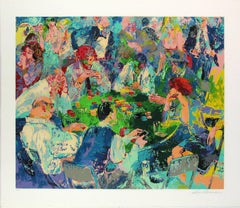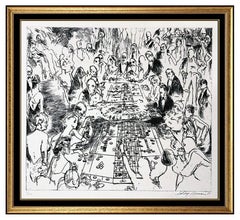Leroy Neiman Poker
Recent Sales
1980s Contemporary Prints and Multiples
Screen
1980s Post-Impressionist Portrait Prints
Etching
1980s Post-Impressionist Figurative Prints
Screen
1980s Contemporary Figurative Prints
Screen
1980s Abstract Expressionist More Art
Tapestry
LeRoy Neiman for sale on 1stDibs
LeRoy Neiman, born LeRoy Runquist, is best known for his vibrantly colored paintings and screen prints, which draw on Impressionism and Pop Art and frequently feature portraits of athletes and musicians as well as depictions of sporting events. He is renowned for creating art during live coverage of the Olympics and other major American and international sports competitions. He once commented, “I use (bold) color to emphasize the scent, the spirit, and the feeling of the thing I’ve experienced.”
Born in Saint Paul, Minnesota, Neiman showed an early aptitude for drawing. After returning home from WWII, he studied at the Saint Paul School of Art and the School of the Art Institute of Chicago (SAIC), where his classmates included Robert Indiana and Leon Golub. Upon graduation in 1950, he began teaching at SAIC.
In 1953, his oil painting Idle Boats won first prize at the Twin City Show, where the Minneapolis Art Institute purchased it. Neiman’s reputation quickly grew, and museums such as the Carnegie Pittsburgh International Exhibition of Contemporary Painting, the Art Institute of Chicago and the Corcoran Gallery of Art in Washington purchased his works.
In 1954, Neiman’s famous association with Playboy magazine began to take shape. Hugh Hefner commissioned Neiman to create an illustration for this fledgling magazine, and his piece won the 1954 Chicago Art Directors Award. This led to a relationship with Playboy that lasted five decades and included Neiman writing and illustrating the “Man at His Leisure” section and the creation of the well-known “Femlin” — a female nymph wearing only opera gloves, stockings and high heels — which appeared on the “Party Jokes” page in every issue since 1955.
In 1970, the 5th Dimension commissioned Neiman to create a cover illustration for the pop group’s album Portrait. In 1994, he created the illustration used for the playbill and the immense Broadway mural for the musical Busker Alley. He was inducted as a Laureate of The Lincoln Academy of Illinois and awarded the highest honor of the state of Illinois, the Order of Lincoln, in 2009.
Today, you can find Neiman’s works in the collections of the Smithsonian American Art Museum in Washington, the Art Institute of Chicago, and the Indianapolis Museum of Art (Newfields), among others.
On 1stDibs, find LeRoy Neiman prints, drawings, paintings and more.
Finding the Right prints-works-on-paper for You
Decorating with fine art prints — whether they’re figurative prints, abstract prints or another variety — has always been a practical way of bringing a space to life as well as bringing works by an artist you love into your home.
Pursued in the 1960s and ’70s, largely by Pop artists drawn to its associations with mass production, advertising, packaging and seriality, as well as those challenging the primacy of the Abstract Expressionist brushstroke, printmaking was embraced in the 1980s by painters and conceptual artists ranging from David Salle and Elizabeth Murray to Adrian Piper and Sherrie Levine.
Printmaking is the transfer of an image from one surface to another. An artist takes a material like stone, metal, wood or wax, carves, incises, draws or otherwise marks it with an image, inks or paints it and then transfers the image to a piece of paper or other material.
Fine art prints are frequently confused with their more commercial counterparts. After all, our closest connection to the printed image is through mass-produced newspapers, magazines and books, and many people don’t realize that even though prints are editions, they start with an original image created by an artist with the intent of reproducing it in a small batch. Fine art prints are created in strictly limited editions — 20 or 30 or maybe 50 — and are always based on an image created specifically to be made into an edition.
Many people think of revered Dutch artist Rembrandt as a painter but may not know that he was a printmaker as well. His prints have been preserved in time along with the work of other celebrated printmakers such as Pablo Picasso, Salvador Dalí and Andy Warhol. These fine art prints are still highly sought after by collectors.
“It’s another tool in the artist’s toolbox, just like painting or sculpture or anything else that an artist uses in the service of mark making or expressing him- or herself,” says International Fine Print Dealers Association (IFPDA) vice president Betsy Senior, of New York’s Betsy Senior Fine Art, Inc.
Because artist’s editions tend to be more affordable and available than his or her unique works, they’re more accessible and can be a great opportunity to bring a variety of colors, textures and shapes into a space.
For tight corners, select small fine art prints as opposed to the oversized bold piece you’ll hang as a focal point in the dining area. But be careful not to choose something that is too big for your space. And feel free to lean into it if need be — not every work needs picture-hanging hooks. Leaning a larger fine art print against the wall behind a bookcase can add a stylish installation-type dynamic to your living room. (Read more about how to arrange wall art here.)
Find fine art prints for sale on 1stDibs today.

